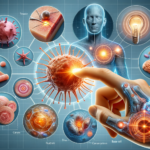Introduction to Estrogen and Breast Cancer
Estrogen, a vital hormone in the female body, plays a significant role in various physiological processes. However, its involvement in breast cancer development is a topic of considerable research and concern. Estrogen can stimulate the growth of breast cancer cells, making it a critical factor in certain types of breast cancer. Understanding the intricacies of how estrogen influences cancer progression is essential for developing effective treatment strategies.
Breast cancer is one of the most common cancers affecting women worldwide. Research indicates that approximately 70% of breast cancers are estrogen-receptor-positive (ER-positive), meaning they require estrogen to grow. This connection has led to the development of targeted therapies aimed at disrupting estrogen’s role in cancer cell proliferation. As science advances, new treatments and medications continue to emerge, offering hope to patients and healthcare professionals seeking more effective management options.
Current Estrogen-Targeted Treatments
Traditional treatments for ER-positive breast cancer often involve hormone therapies that target estrogen’s effects on cancer cells. These therapies include selective estrogen receptor modulators (SERMs) and aromatase inhibitors. SERMs, such as tamoxifen, work by blocking estrogen receptors on cancer cells, preventing estrogen from binding and stimulating cell growth. Aromatase inhibitors, on the other hand, reduce the amount of estrogen produced in the body by inhibiting the aromatase enzyme responsible for converting androgens into estrogen.
These treatments have been instrumental in managing ER-positive breast cancer, particularly in postmenopausal women. However, they are not without side effects. Patients may experience hot flashes, fatigue, and an increased risk of osteoporosis, among other symptoms. Despite these challenges, SERMs and aromatase inhibitors remain a cornerstone of breast cancer treatment due to their effectiveness in reducing recurrence and improving survival rates.
Innovative Estrogen-Related Treatments
Recent advancements in breast cancer research have led to the development of new treatment options that offer promising outcomes for patients. One such innovation is the use of selective estrogen receptor degraders (SERDs). Unlike SERMs, which block estrogen receptors, SERDs degrade them, offering a more comprehensive approach to preventing estrogen-driven cancer cell growth. This novel mechanism presents an exciting opportunity for patients who may not respond well to existing therapies.
Another area of exploration is the combination of targeted therapies with traditional hormone treatments. Combining therapies can potentially enhance treatment efficacy and overcome resistance that may develop with single-agent therapies. Clinical trials are ongoing to evaluate the safety and effectiveness of these combination approaches, with early results showing promise in extending progression-free survival for patients.
Understanding Estrogen Medications
Estrogen medications are not only pivotal in treating breast cancer but also play a role in managing menopausal symptoms and supporting bone health. In the context of breast cancer, estrogen medications are carefully selected based on the patient’s specific cancer subtype, menopausal status, and overall health. The choice of medication can significantly impact treatment outcomes, making personalized medicine an essential aspect of care.
For patients with ER-positive breast cancer, medications such as tamoxifen and letrozole are commonly prescribed. These drugs have been extensively studied and have demonstrated efficacy in reducing cancer recurrence. Additionally, the development of biosimilars and generic versions of these medications has improved accessibility and affordability, allowing more patients to benefit from these life-saving treatments.
Conclusion: Navigating the Future of Estrogen-Related Breast Cancer Treatments
As research continues to unravel the complexities of estrogen’s role in breast cancer, the landscape of treatment options is evolving. Patients and healthcare providers must stay informed about the latest advancements to make well-informed decisions regarding care. The integration of innovative therapies, such as SERDs and combination treatments, holds the potential to transform the management of ER-positive breast cancer, offering renewed hope and improved outcomes.
Ultimately, the journey toward effective breast cancer treatment is a collaborative effort that requires the dedication of researchers, clinicians, and patients alike. By embracing the latest scientific discoveries and fostering an environment of continuous learning, the fight against breast cancer becomes increasingly hopeful and promising.








